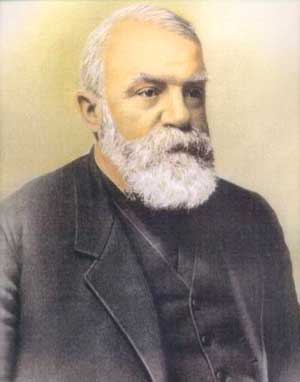
Young Moody's Conversion
Let me give you a leaf out of my experience. When I was in Boston I used to attend a Sabbath-school class, and one day I recollect a Sabbath-school teacher came around behind the counter of the shop I used to work in, and put his hand on my shoulder, and talked to me about Christ and my soul. I had not felt I had a soul till then. I said, "This is a very strange thing; here is a man who never saw me till within a few days, and he is weeping over my sins, and I never shed a tear about them." But I understand it now, and know what it is to have a passion for men's souls and weep over their sins. I don't remember what he said, but I can feel the power of that young man's hand on my shoulder to-night. Young Christian men, go and lay your hand on your comrade's shoulder, and point him to Jesus. Well, he got me up to the school, and it was not long before I was brought into the kingdom of God. I went thousands of miles away after that, but I often thought I should like to see that man again. Time rolled on, and at length I was at Boston again; and I recollect, one night when I was preaching there, a fine, noble-looking young man came up the aisle, and said, "I should like to speak with you, Mr. Moody; I have often heard my father talk about you." "Who is your father?" I asked. "Edward Kemble," was the reply. "What!" said I, "my old Sunday-school teacher?" I asked him his name, and he said it was Henry, and that he was seventeen years of age. I tried to put my hand on his shoulder just where his father did on my shoulder, and I said to him, "You are just as old as I was when your father put his hand on my shoulder. Are you a Christian, Henry?" "No, sir," he said; and as I talked to him about his soul with my hand on his shoulder, the tears began to trickle down. "Come," said I, "I will show you how you can be saved," and I took him into a pew and quoted promise after promise to him. And I went on praying with him, but as he did not get light, I read to him the fifty-third chapter of Isaiah, "All we, like sheep, have gone astray." "Do you believe that, Henry?" "Yes, sir, I know that's true." "'We have turned every one to his own way.' Is that true?" "Yes, sir; that's true, and that's what troubles me; I like my own way." "But there is another sentence yet, Henry; 'The Lord hath laid on Him the iniquity of us all.' Do you believe that, Henry?" "No, I do not, sir." "Now," I said, "why should you take a verse of God's word and cut it in two, and believe one part and not another. Here are two things against you, and you believe them; and here is one in your favor, but you won't believe that. What authority have you for serving God's word in that way?" "Well," he said, "Mr. Moody, if I believed that I should be saved." "I know you would," I replied, "and that's exactly what I want you to do. But you take the bitter, and won't have the sweet with it." So I held him to that little word hath— "He hath laid on Him the iniquity of us all."